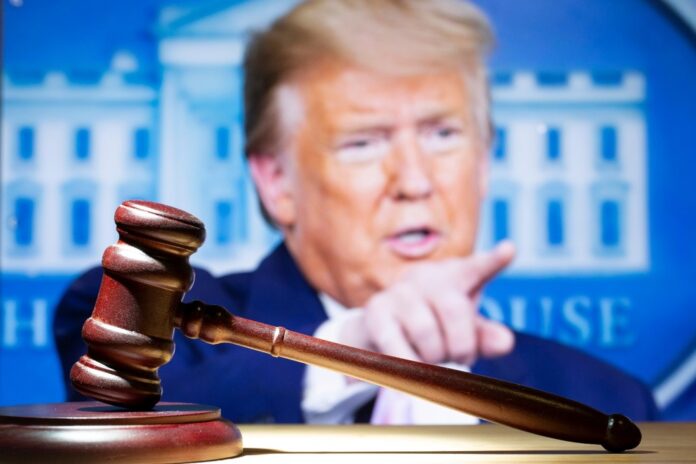In an unprecedented legal scenario, the timing of Donald Trump’s trial in Fulton County may collide with the 2024 presidential election, forcing Fulton County jurors to make challenging decisions. As the presumptive Republican nominee, Trump faces District Attorney Fani Willis’s proposed August 5 trial start date, extending into 2025. The potential for Trump’s trial to coincide with Election Day has sparked contentious debates during a recent hearing.
Trump’s lead Atlanta lawyer, Steve Sadow, argued against holding the trial around Election Day, emphasizing the potential interference with his ability to campaign for the presidency. The complex situation prompts questions about jurors’ political inclinations as they navigate the unique dilemma of voting for or against Trump while adjudicating his case.
Legal experts weigh in on additional complications, including the possibility of Trump not being the GOP nominee or, if elected in 2024, whether he can stand trial after his inauguration in 2025. Trump’s legal team invokes the supremacy clause, asserting that the trial should not proceed during his presidency.
Constitutional scholars, such as Norm Eisen, challenge this assertion, emphasizing that sitting presidents are not immune to state laws. The potential for a trial during the election season introduces unprecedented challenges, prompting suggestions to expedite proceedings before the election to avoid post-election complexities.
Despite legal and constitutional interpretations, political figures like Josh McKoon, Chair of the Georgia Republican Party, accuse Willis’s prosecution of being politically motivated and unconstitutional. As the legal and political landscapes intertwine, the trial’s scheduling becomes a focal point, highlighting the intricate balance between legal proceedings and the democratic electoral process. The unprecedented nature of this situation underscores the evolving complexities at the intersection of law and politics.
The potential clash between Donald Trump’s trial and the 2024 presidential election introduces a myriad of legal, political, and ethical complexities. The unique scenario prompts a closer examination of the key factors at play and the implications for both the legal proceedings and the democratic process.
The timing of Trump’s trial, coinciding with the election season, raises questions about its impact on the electoral process. Trump’s lead attorney argues that such a trial would amount to unprecedented election interference, potentially restricting his ability to campaign effectively. This contention reflects the broader concern of balancing legal proceedings with political rights.
The potential dilemma facing jurors is particularly noteworthy. They may find themselves in the unprecedented position of not only adjudicating a case involving a former president but also making decisions about their political preferences during the voting process. This interplay of legal responsibility and civic duty underscores the complexity of the situation.
Trump’s legal team invokes the supremacy clause, arguing that a sitting president cannot stand trial during their term. However, legal experts, including Norm Eisen, dispute this interpretation, emphasizing that no one, including the president, is above state laws. The constitutional nuances and precedents in this context remain open to interpretation.
The suggestion to expedite the trial before the election, while challenging, could be seen as a pragmatic approach to avoid potential post-election complications. However, the inherent complexities of the legal process, including the possibility of appeals and ongoing proceedings, make such a timeline challenging to achieve.
The potential clash between Trump’s trial and the 2024 election introduces a multifaceted and unprecedented challenge at the intersection of law and politics. As legal proceedings unfold, the delicate balance between justice, electoral processes, and public perception will shape the narrative and contribute to evolving discussions about the intersection of legal and political responsibilities. The outcome of this case could have a lasting impact on the understanding of legal proceedings involving high-profile political figures.
- Pet Friendly Ice Melt for Snow: Our pet friendly ice melt for snow is designed to quickly and efficiently melt snow and ice, while being safe for pets to walk on. It's the perfect choice for keeping your pathways clear and safe for everyone in your family, including your pets.
- Quality is Key: Our snow and ice melt won't sacrifice the quality of standard rock salt for snow and other winter salt products. Paw Protector dog safe salt melt melts snow and ice at temperatures as low as -22 degrees fahrenheit.
- Keep Your Driveway Clean and Clear: Our ice melt for concrete leaves NO visible residue, unlike other pet safe ice melter products. Avoid excessive stains to concrete to maintain a cleaner appearance!
- Concrete Safe Ice Melt: Melt snow with a product that is far less corrosive than rock salt and calcium chloride ice melt. Keep your concrete safer from cracks and other winter stresses.
- Think of your Neighbors: When choosing an ice melt for snow always remember to use a pet friendly product to keep everyone in the neighborhood safe, whether they have four legs or two!
- Pet Friendly Ice Melt: Our product is designed with your pets' safety in mind. This ice melt is pet friendly, ensuring that it won't harm your furry friends when they come into contact with it during their outdoor adventures.









